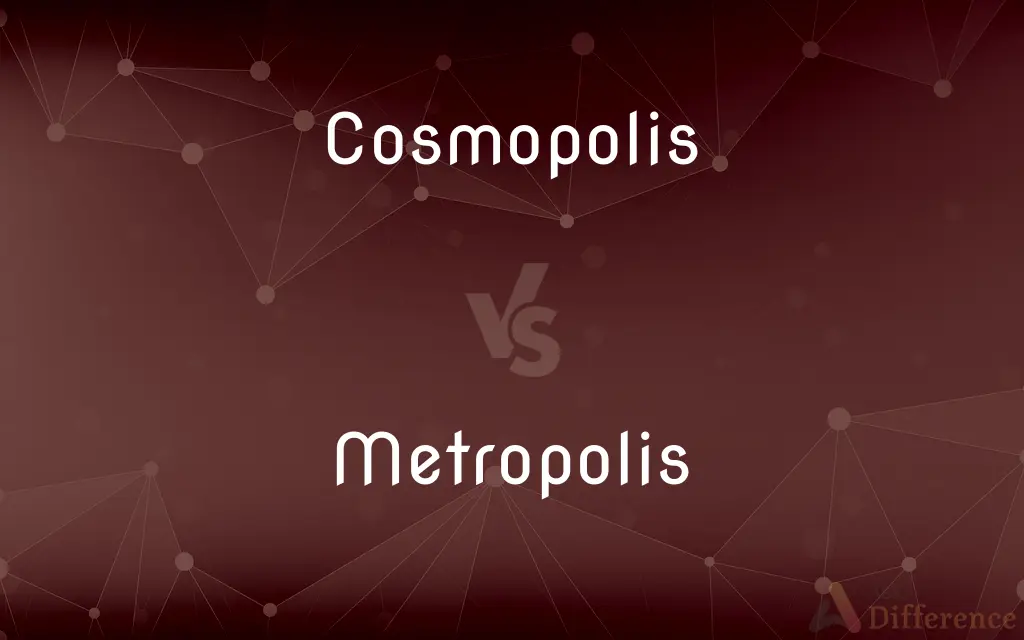Cosmopolis vs. Metropolis — What's the Difference?
Edited by Tayyaba Rehman — By Maham Liaqat — Updated on April 9, 2024
Cosmopolis emphasizes global or cosmopolitan aspects of a city, while metropolis highlights its size, importance, or status as a cultural and economic hub.

Difference Between Cosmopolis and Metropolis
Table of Contents
ADVERTISEMENT
Key Differences
Cosmopolis refers to a city characterized by a cosmopolitan nature, where a global diversity of cultures, ideas, and people coexist and interact. This term underscores the international or universal aspect of urban life, where the focus is on inclusivity and global connectivity. In contrast, a metropolis is a large and significant city that serves as a central hub for its region or country, often associated with economic, political, and cultural importance. It emphasizes the city's size, influence, and role as a pivotal center of activity.
The concept of a cosmopolis extends beyond physical size or economic power to encapsulate an idea of cultural pluralism and internationalism. Cities described as cosmopolises are praised for their ability to blend a wide array of cultural expressions, languages, and traditions, promoting a sense of global citizenship. On the other hand, the idea of a metropolis might not inherently include such a diverse or international component, focusing more on the city's dominance in certain spheres such as finance, industry, or culture within a more localized or national context.
While cosmopolis highlights the seamless integration of global cultures and the fostering of a worldwide community within urban settings, a metropolis may or may not possess this attribute. The term metropolis could refer to a city's prominence and bustling activity without necessarily indicating a significant international demographic. Cities like New York and London can be considered both cosmopolises and metropolises, illustrating how they embody global diversity while also serving as key urban centers of economic and cultural activity.
The appeal of a cosmopolis lies in its embodiment of global unity and cultural exchange, making it an ideal for many in an increasingly globalized world. Conversely, the allure of a metropolis is often its capacity to offer extensive opportunities, amenities, and services, along with its influential position in national and international affairs. Therefore, while all cosmopolises can be considered metropolises due to their significance and scale, not all metropolises achieve the status of a cosmopolis without a distinct international and cosmopolitan character.
Comparison Chart
Definition
A city with a cosmopolitan and global character, emphasizing cultural diversity and internationalism.
A large and significant city, often a cultural, economic, and administrative center.
ADVERTISEMENT
Focus
Cultural pluralism, global diversity, and international connectivity.
Size, importance, and role as a regional or national hub.
Key Characteristics
Global citizenship, integration of diverse cultures, and promotion of global unity.
Economic, political, and cultural dominance; centralization of resources and activities.
Examples
Cities like Toronto, which are known for their multicultural population and international outlook.
Cities like Tokyo, recognized for their large population, economic power, and cultural influence.
Implications
Suggests an ideal of urban living that transcends national boundaries, fostering a sense of global community.
Indicates a city's leading position in its country or region, with a focus on its capacity and influence.
Compare with Definitions
Cosmopolis
Represents global citizenship and unity.
The city's cosmopolis status attracts international talents.
Metropolis
Urban area central to a region.
People flock to the metropolis for work and entertainment.
Cosmopolis
Urban area with a focus on internationalism.
The festival turned the city into a vibrant cosmopolis.
Metropolis
Focuses on urban significance and scale.
The metropolis dominates the country's skyline.
Cosmopolis
Characterized by cultural pluralism.
The cosmopolis is celebrated for its array of international cuisines.
Metropolis
A large, influential city.
The metropolis stood as a beacon of progress and opportunity.
Cosmopolis
A city that is globally diverse and inclusive.
As a cosmopolis, the city thrives on its multiculturalism.
Metropolis
Signifies a city's dominance.
The city's evolution into a metropolis changed the regional dynamics.
Cosmopolis
City where global cultures converge.
Living in a cosmopolis broadens one's perspective.
Metropolis
Economic and cultural center.
The metropolis is bustling with activity day and night.
Cosmopolis
A large city inhabited by people from many different countries.
Metropolis
A metropolis () is a large city or conurbation which is a significant economic, political, and cultural center for a country or region, and an important hub for regional or international connections, commerce, and communications. The term is Ancient Greek (μητρόπολις) and means the "mother city" of a colony (in the ancient sense), that is, the city which sent out settlers.
Cosmopolis
An important city, such as a capital city, inhabited by people from a diverse range of cultural backgrounds.
Metropolis
A major city, especially the chief city of a country or region
Chicago, the metropolis of the Midwest.
Metropolis
A city or an urban area regarded as the center of a specific activity
A great cultural metropolis.
Metropolis
(Ecclesiastical) The chief see of a metropolitan bishop.
Metropolis
The mother city or country of an overseas colony, especially in ancient Greece.
Metropolis
The mother (founding) polis (city state) of a colony.
Metropolis
A large, busy city, especially as the main city in an area or country or as distinguished from surrounding rural areas.
Capital city
Metropolis
(Orthodox Christianity) The see of a metropolitan bishop, ranking above its suffragan diocesan bishops.
Metropolis
(ecology) A generic focus in the distribution of plants or animals.
Metropolis
The mother city; the chief city of a kingdom, state, or country.
[Edinburgh] gray metropolis of the North.
Metropolis
The seat, or see, of the metropolitan, or highest church dignitary.
The great metropolis and see of Rome.
Metropolis
Any large city.
Metropolis
A large and densely populated urban area; may include several independent administrative districts;
Ancient Troy was a great city
Metropolis
People living in a large densely populated municipality;
The city voted for Republicans in 1994
Common Curiosities
How is a metropolis different from a cosmopolis?
A metropolis is primarily recognized for its size, economic, and cultural importance, focusing on its role as a hub, unlike a cosmopolis, which emphasizes global diversity and cultural exchange.
What makes a city a cosmopolis?
A city becomes a cosmopolis through its integration of diverse cultures, languages, and traditions, fostering a global community.
Is every metropolis a cosmopolis?
Not every metropolis is a cosmopolis; a city must exhibit a significant level of global diversity and cultural exchange to be considered a cosmopolis.
How does a metropolis impact its region or country?
A metropolis impacts its region or country by serving as a central hub for economic, cultural, and political activities, influencing national and sometimes international trends.
Can a city be both a cosmopolis and a metropolis?
Yes, cities like New York and London are both cosmopolises and metropolises, showcasing global diversity alongside economic and cultural significance.
What are the benefits of living in a cosmopolis?
Living in a cosmopolis offers exposure to diverse cultures, broadening perspectives, and fostering a sense of global citizenship.
What defines a cosmopolis?
A cosmopolis is defined by its global diversity and inclusivity, emphasizing cultural pluralism and international connections within an urban context.
Can a cosmopolis exist without being a metropolis?
Given that cosmopolis emphasizes global diversity within an urban setting, it inherently involves a certain scale and significance, aligning with the characteristics of a metropolis.
Why is the concept of a cosmopolis important?
The concept of a cosmopolis highlights the importance of cultural diversity, global unity, and internationalism in urban development and living.
What challenges can arise in a cosmopolis?
Challenges in a cosmopolis may include managing cultural integration, ensuring equitable opportunities for all residents, and maintaining harmony in a highly diverse population.
Share Your Discovery

Previous Comparison
Jam vs. Puree
Next Comparison
Depression vs. ImpressionAuthor Spotlight
Written by
Maham LiaqatEdited by
Tayyaba RehmanTayyaba Rehman is a distinguished writer, currently serving as a primary contributor to askdifference.com. As a researcher in semantics and etymology, Tayyaba's passion for the complexity of languages and their distinctions has found a perfect home on the platform. Tayyaba delves into the intricacies of language, distinguishing between commonly confused words and phrases, thereby providing clarity for readers worldwide.
















































